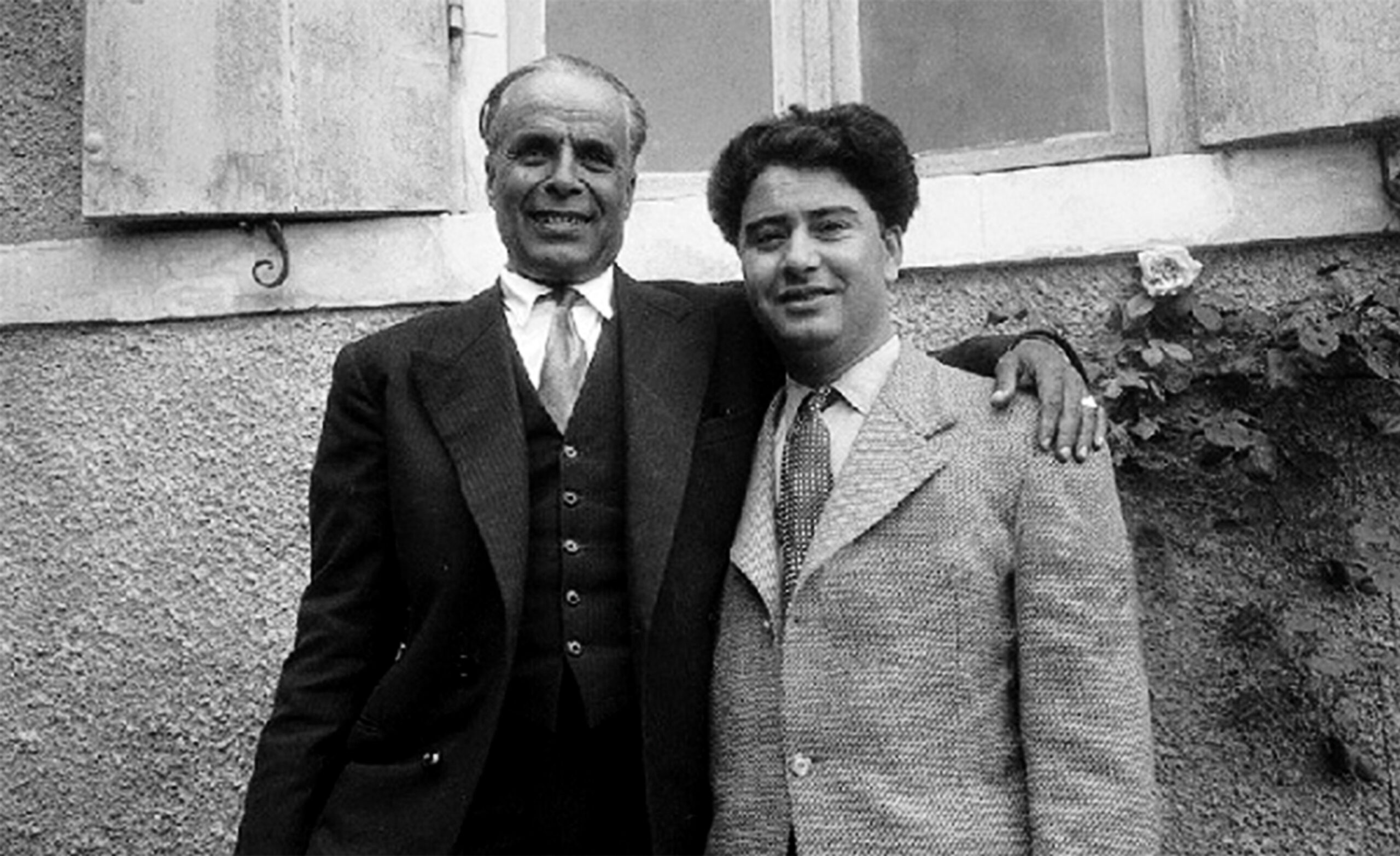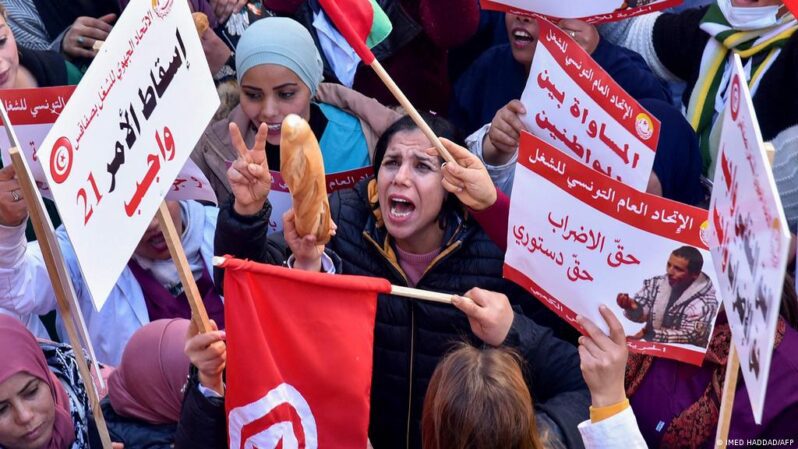Ahmed Ben Salah and Tunisia’s Cooperative Experiment: Under Bourguiba’s Shadow

Ahmed Ben Salah, who hailed from Moknine in Monastir Governorate and held a master’s degree in Arabic from France, was known for his unionist activities in his thirties but never expected that an entire decade of Tunisia’s modern history (the 1960s) would become associated with his economic and planning ideas. Nor did he anticipate that the same decade would witness his removal from a position of influence and marginalization, first as a prisoner and then as an exile estranged from his country.
In 1954, Ben Salah was elected general secretary of the Tunisian General Labour Union (UGTT). Even though he had supported President Habib Bourguiba in his battle against Salah ben Youssef, the “Supreme Struggler” – as Bourguiba was known – was apprehensive about the growing unionist power and increasing popularity of its leaders, foremost among them Ben Salah. Hence, Bourguiba employed his skill of “splitting the ranks” without leaving traces of incitement, fueling the divide within the unionist house and ultimately causing Ben Salah’s removal from the UGTT’s General Secretariat. However, Bourguiba did not fully exclude Ben Salah from the political landscape; rather, he lured him to his lair once more and appointed him minister of health in 1957.[1]
The prompt return to Bourguiba’s embrace marked a new chapter in the life of the disfavored unionist. In the following years, Ben Salah had remarkable influence in administering the state and subordinating the ruling party’s apparatus to his socioeconomic conceptions, displaying much aptitude in persuasion, maneuvering, and controlling others while capitalizing on Bourguiba’s support and praise. While Ben Salah was striving for the triumph of his plan and ideas, the leader was busy capitalizing on these ideas to maintain his authority and tighten the state’s grip over life and society. In this manner, Ben Salah and Bourguiba marched together for a time…
Ben Salah: The Savior from “Economic Waywardness”
In the first years following the declaration of independence, the new ruling elite never managed to formulate an economic approach that met the needs of a society exhausted by decades of colonialism and aspiring toward a less miserable fate. Following 1956, the scale tipped toward an ill-considered liberal trend unable to curtail the collapse and structural disintegration that the colonizers’ ships had left behind on their way back to Europe. From 1956 to 1959, the minister of economy changed four times.[2] Within this faltering process, Ben Salah was the person most prepared to disturb the stagnant economic waters and push the ideas of structuring, programming, and planning, drawing on the UGTT’s socioeconomic program.
Ben Salah repeatedly said that rather than waiting for events to occur, an activist can try to influence their course and, if necessary, commit to a top-down plan to change circumstances. In one interview, he asked, “Isn’t it morally better for an activist to commit to changing circumstances and rebelling against perverse ones, if necessary from above, in order to push his society toward progress according to the set plan rather than to watch and wait for events to occur?”[3] This enthusiasm befitted the Bourguiba government’s lack of an economic vision and its need for a new approach that would ingratiate it with society and legitimize its ability to build. From 1957 to 1968, Ben Salah passed through several ministries – namely health, social affairs, planning and finance, economy, agriculture, and national education – and former French prime minister Edgar Faure nicknamed him the “minister of everything”.
The economy of the new postcolonial state was now clearly in the hands of the young Bourguiba-backed unionist, who would push for socioeconomic change based on five principles: decolonization, human advancement, regional development, structural reform, and planning. The cooperative experiment, inaugurated in the early 1960s, became a framework for his ideas as well as his defeats. To him, it was a means of laying the foundation for agricultural reform that would overcome the fragmentation of landholdings, rectify the deficiency of Tunisian agriculture, and underpin a new developmental equilibrium among the regions and areas. The project involved forming cooperative units for agricultural production, which would increase from the mid-1960s onward. Ben Salah wove high hopes around these cooperative units, even deeming them the foundation for a “new society”.[4]
Cooperation Honed by the Leader’s Enthusiasm
Bourguiba’s rhetoric bestowed a sacred, nationalist dimension upon the cooperative experiment and elevated its architect – Ben Salah – to the status of a heroic savior. Everyone – both the elite and the masses – accepted the experiment, swayed by leader Bourguiba’s charisma and might. Inside the new experiment, the trinity of leader, party, and state was forged, and from 1963, socialism was the new banner of the Destourian Party, which began calling itself the “Socialist Destourian Party”. That year, Bourguiba unequivocally declared the end of the era of independent national organizations, ordering all civil and political actors to join the experiment. Consequently, constitutional socialism advanced over “a land devoid of tolerance, discussion, and cooperation”.[5] Bourguiba declared that all influence and capacities must be harnessed by the ruling party’s leaders and members to make the experiment a success.
Although Ben Salah always repeated that he never agreed to exercise power without explaining the ideas that would guide him in his duties, he did not manage to stand against the sweeping authoritarian current that exploited the experiment for propagandistic and political purposes to the furthest extent. He was also unable to overcome his opponents and those waiting to pounce on any misstep. Thus, Bourguiba’s decision in late 1968 to universalize cooperatives, which he made without consulting Ben Salah, paved the way for the coup de grace to the cooperative experiment in 1969 and the permanent removal of its architect from government circles. In subsequent interviews, Ben Salah affirmed that he disapproved of Bourguiba’s decision because he saw it as arbitrary and it was not based on field studies clarifying the experiment’s status. He said that he advocated proceeding with the establishment of the cooperative units for agricultural production in a methodical and informed manner and that on many occasions, he refused to inaugurate new units that regional party and state officials stood behind.[6]
Although Ben Salah distanced himself from the decision to universalize cooperatives and showed his opposition to it one way or another, the experiment was, since the beginning, treading the authoritarian path and driven by a top-down tendency that often helped to undermine the cooperatives’ independence and marginalize the real actors inside them, such as small and medium farmers. Consequently, these new institutions transformed into “mere agricultural organizations subordinate to centralized political authority, from supervising ministries to governors to delegates”.[7]
When Bourguiba Praises One of His Ministers
While Ben Salah was enjoying Bourguiba’s acknowledgments and laudation, trying to capitalize on his support and excellent ability to influence and persuade, some circles of government strongly resented this praise. They saw Ben Salah as a “mini Bourguiba” seeking to occupy positions and break up political and symbolic spaces. Hence, the toppling of the cooperative experiment was an avenue for toppling its architect and taking him out of the picture. The opponents exploited some of the protest movements against the universalization of the cooperative experiment such as those that broke out on 27 January 1969 in Ouardanine, which the political authority repressed via a security forces intervention that left one dead and several wounded. Ben Salah continued to see these events as “family disputes” that did not reflect popular rejection of the cooperative experiment, whereas his enemies used them as evidence of the failure of his socialist policy.
In autumn of 1969, Bourguiba called Ben Salah to dismiss him as minister of economy, proposing that he continue as minister of national education. Although Bourguiba tried to soften the blow by presenting the decision – as usual – as necessary for maintaining consensus among the branches of government, Ben Salah realized that his enemies would, as he put it, “go far against him”[8] and that the plots he had sensed after the president fell ill in 1967 had become tangible facts. In his later admissions, he said that the front of enemies included not only politicians and people close to Bourguiba but also some of the people in charge of security agencies, such as the director of national security, who incited the populace against the cooperative policy.[9] When oversight over the economy was pulled from him, Ben Salah received offers to leave the country and withdraw from the local scene, with Habib Bourguiba Jr. proposing that he go to Madrid as an ambassador. However, the wishes of the president’s wife Wassila Bourguiba, who whispered to Prime Minister Bahi Ladgham that Ben Salah should “pass by his aunt’s house” (a Tunisian euphemism for prison) before he left,[10] were closer to the future outcome. Ben Salah was tried for “high treason” and, on 19 May 1970, sentenced by the Supreme Court to ten years of imprisonment and hard labor and loss of political rights. However, in February 1973, he managed to escape prison and travel secretly to Algeria and then Europe.
After the tribulation of prison and political cleansing and then exile, Ben Salah maintained that the cooperative experiment did not fail but was “made to fail”, deeming that absolute reliance on Bourguiba led to its demise. He summarized his major error thusly: “I committed no mistakes against my people, but I committed them against myself because I was raised to respect my leaders and elders”.[11]
This article is an edited translation from Arabic.
[1] Abd al-Jalil Buqirra, al-Nizam al-Burqibiyy: al-Su’ud wa-l-Inhidar, Perspectives Edition, Tunis, 2012, p. 40.
[2] Wassim Abidi, “Dynamique d’Economie Sociale et Solidaire en Tunisie”, Master’s thesis, Institut National Du Travail Et Des Etudes Sociales, Université de Carthage, 2015, p. 19.
[3] Burqirra, al-Nizam al-Burqibiyy, op. cit., p. 30.
[4] Noura Borsali, Livre d’entretiens avec Ahmed Ben Salah, Samed éditions, Tunis, 2008, p. 105.
[5] Safi Said, Burqiba: Sira Shibh Muharrama, Riad El-Rayyes Books, Beirut, 2000, p. 291.
[6] Borsali, Livre d’entretiens, op. cit., p. 107.
[7] Working Group for Food Sovereignty, Ghidha’una, Filahatuna, Sayadatuna: Tahlil li-l-Siyasat al-Tunisiyya ‘ala Daw’ Mafhum al-Siyada al-Ghidha’iyya, 2019, p. 147.
[8] Borsali, Livre d’entretiens, op. cit., p. 122.
[9] Ibid., p. 128.
[10] Ibid., p. 134.
[11] Ibid., p. 119.



